
January-March-2016
Editorial

Since its inception, BCCP has been facilitating behavior change through raising awareness by providing accurate information to the audience on social development and public health. To this end, BCCP has been conducting Advances in Family Health and Social Communication Workshop every year since 1994. In continuation of this, the 21st Advances in Strategic Communication Workshop was held this year from February 27-March 10, 2015.
It may be mentioned here that the content and design of the advances workshop is being updated every year considering the views, opinion and feedback of the participants. The objective of this year’s advances workshop was to provide the participants an opportunity to enhance their understanding of Social and Behavior Change Communication, knowledge and skills. Moreover, the workshop introduced the participants with different tools and techniques of state-of-the-art communication. Our effort will only be realized when the participants will be able to practice these effectively in a real life scenario.
In doing so, BCCP continues to play a major role in promoting public health, education and social development. Along with the advances workshop, other news on various projects have been highlighted with due importance in the present issue of Sangjog.
A heartfelt gratitude to all.
Training on CRPARP Website Held
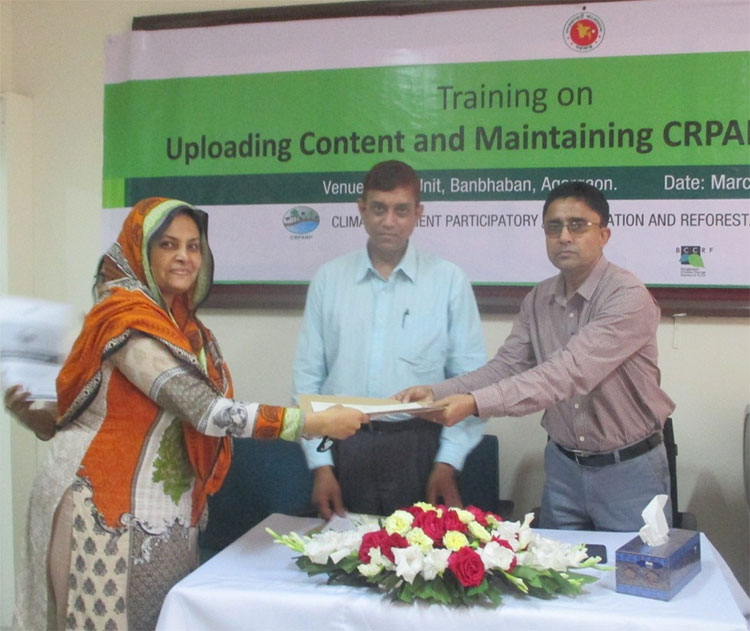
Bangladesh Center for Communication Programs (BCCP) organized a day-long training on how to update, upload content and day-to-day maintenance of the Climate Resilient Participatory Afforestation and Reforestation Project (CRPARP) website. Bangladesh Forest Department and concerned officials of CRPARP attended the hands on training which was held on March 10, 2016 in RIMS Unit of Bangladesh Forest Department (BFD). BCCP’s IT Expert and the developer of this website jointly facilitated the training.
This website will facilitate sharing of information and news regarding the activities that are being implemented to address the adverse effects of climate change in Bangladesh. The CRPARP project aims to reduce forest degradation and increase forest coverage through participatory planning/monitoring; and to contribute in building the long-term resilience of communities in coastal and hilly areas to climate change. BCCP has been implementing strategic communication program of this project. The website is a part of this program.
This website (www.crparp-bfd.org) will facilitate sharing of information and news regarding the activities that are being implemented in Bangladesh under CRPARP to reduce forest degradation and increase forest coverage through participatory planning/monitoring; and to contribute in building the long-term resilience of communities in coastal and hilly areas to climate change.
The training program ended with awarding of completion certificate by Mr Uttam Kumar Saha, Project Director, CRPARP, and Md. Zaheer Iqbal, Deputy Conservator of Forests. Ambareen Khan, Communication and Information Specialist of CRPARP; Khadija Bilkis, Team Leader of CRPARP’s Awareness Campaign & Web-based Information Dissemination System; and Deputy Team Leader Kanta Devi were also present among others.
Children Festival news
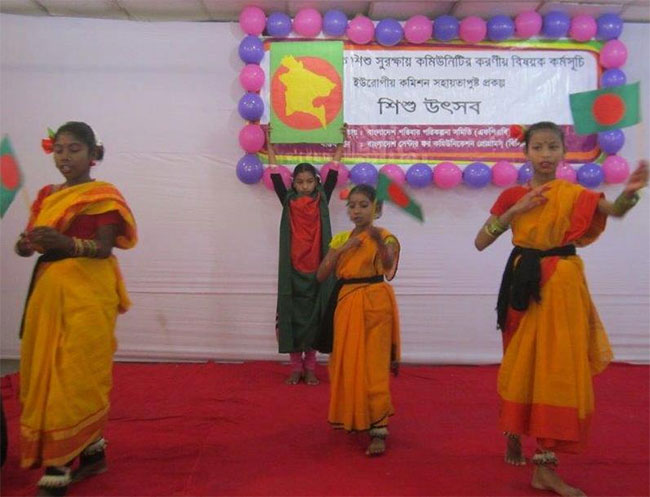
BCCP recently organized a Children Festival among the disadvantaged children in Khulna City Corporation under the Community Action for Child Protection against Violence Project (CACVP) with financial support of European Union. The objective of the children festival is to strengthen community actions for child protection by using multi-formatted communication media tools.
Mr. Shekh Abdul Hamid, Deputy Director, Department of Social Services, Khulna inaugurated the Children Festival as Chief Guest. In this event, Professor Anowarul Kadir, Executive Director, Sundarban Academy, Mr Swapan Kumar Guha, Founder & Executive Director, Rupantar, Ms. Nargis Fatima Zamin, District Women Affairs Officers, Mr. Abul Alam, District Children Affairs Officer, Bangladesh Shishu Academy, were present as special guests.
The Chief Guest said in his speech “Social awareness has to be created in order to create a children friendly and violence free environment so that every child can grow up physically and mentally and to achieve it individuals and child based institutions will have to be actively involved”
Stakeholders, who were present in the event, expressed their feelings that they did not see such successful children festival for the marginalized children before. Other Guests discussed on the present situation of child protection in Bangladesh. At the end of the festival, children shared their feelings by saing “We would have more fun if the duration of the child festival was longer.”
The disadvantaged children of Bangladesh Shishu Academy, Directorate of Women Affairs, Directorate of Social Service, UCEP Bangladesh, JJS, MSSUS, Aparajeyo Bangladesh, BRAC, Sheikh Russell Training and Rehabilitation Center, Light Bangladesh participated in the Children Festival. Children performed Patriotic song, Modern and Folk song, Dance, Theatre/Drama, Recitation, Jokes, Storytelling etc.
CRPARP Website Launching Event Held
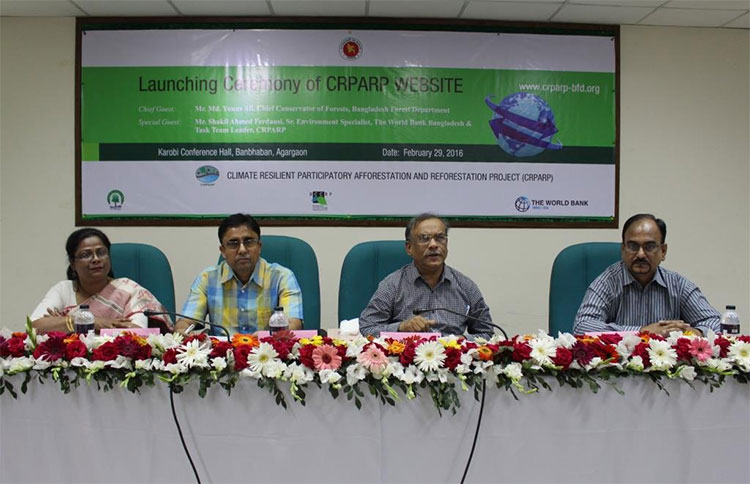
The website of Climate Resilient Participatory Afforestation and Reforestation Project (CRPARP) was launched on February 29, 2016. Bangladesh Forest Department’s Chief Conservator of Forests Md. Yunus Ali inaugurated the website as the Chief Guest. The representatives of Bangladesh Forest Department (BFD) and CRPARP project, media and academics were present in the event.
This website will facilitate sharing of information and news regarding the activities that are being implemented to address the adverse effects of climate change in Bangladesh. The CRPARP project aims to reduce forest degradation and increase forest coverage through participatory planning/monitoring; and to contribute in building the long-term resilience of communities in coastal and hilly areas to climate change.
Mr. Uttam Kumar Saha, Project Director, CRPARP, chaired the launching event while Mr. Shakil Ahmed Ferdausi, Sr. Environment Specialist of the World Bank, Bangladeh and Task Team Leader of CRPARP also spoke on the occasion. Ms. Khadija Bilkis, Sr. Deputy Director of Bangladesh Center for Communication Programs (BCCP) and Team Leader of CRPARP’s Strategic Communication Program (SCP) delivered welcome speech in the event.
With country's population growth, dependence on the forest resources for livelihood is also increasing. On the other hand, due to climate change natural disaster such as floods, cyclones, tidal waves, drought etc have also become more frequent in the country. The biodiversity and ecosystems are being affected. In order to address the adverse effects of climate change, the Bangladesh Forest Department and Aranyak Foundation are jointly implementing CRPARP project. This project is being implemented in Cox’s Bazar, Noakhali, Laxmipur, Feni, Barisal, Patuakhali, Barguna and Bhola district. This project is being funded by Bangladesh Climate Change Resilient Fund with assistance of World Bank.
BCCP has been implementing strategic communication program of this project to create awareness, engage behavioral change communication and enhance knowledge of the target audience and general stakeholders on improving participatory forest management and to reduce deforestation. The website is the part of this program.
Produce a TVC for IDEA project
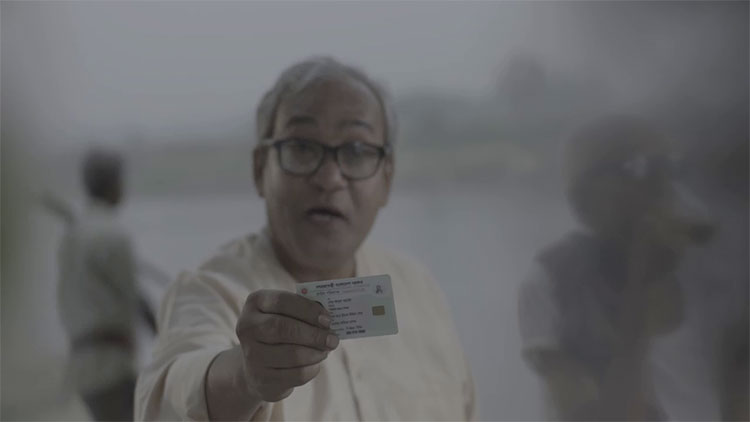
BCCP produced a TVC for the IDEA project featuring the uniqueness of the NID card and the benefits of it. This TVC is intended to create awareness of the people and encourage the citizen to apply for this smart NID card.
The TVC was founded upon different real situations depicting the use of the smart NID Card. By watching the TVC, people would be able to relate the needs of the card with their daily lives.
It is mentioned that IDEA project is being implemented by Election Commission Bangladesh with financial support of World Bank. Under this project, BCCP is directing campaign program through Strategic Communication Component (SCC).
Communication Share Fair ‘Safollo Gatha-2016’ Held
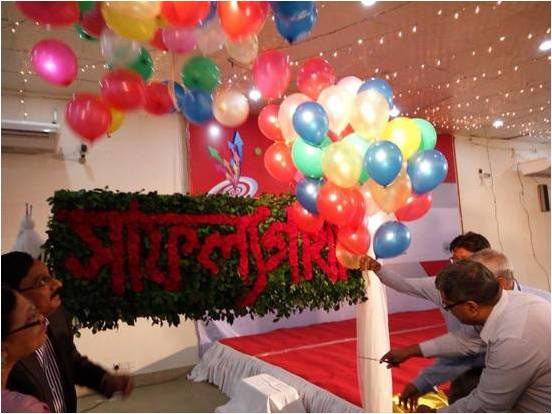
A communication share fair called, ‘Safollo Gatha’ to showcase the best practices for Health, Population and Nutrition (HPN) Social and Behavior Change Communication (SBCC) in Bangladesh was held on March 24, 2016 in Dhaka.
In a festive environment like the fairs and exhibitions in Bangladesh, 11 government, non-government and private organizations shared their successful SBCC interventions in various entertaining modes as well as interactive ways, each followed by a brief discussion session. The participating organizations also had their nicely decorated stalls to provide additional information. To mark the event a souvenir containing the mini abstracts of the 12 submissions was published.
The shared successful interventions were selected following a set of criteria by the Best Practices subgroup of the Bangladesh BCC Working Group.
The objective of holding Safollo Gatha is to recognize the effective SBCC practices and approaches; let other practitioners learn from these; facilitate adaption, replicate or even scale-up instead of reinventing a new solution to similar problems.
This was the second year of Safollo Gatha. The first one was held in 2015 and created a huge interest among the communication practitioners, policy-makers and development partners.
Dr. Ehteshamul Haq Chowdhury, Director (admin), DGHS; Dr. A B M Mujharul Islam, Director, IPHN and Line Director, National Nutrition Services (NNS); Ms. Sharifa Begum, Chief, BHE and Line Director, Health, Education and Promotion; and Dr. Md. Sharif, Director, MCH Services, DGFP were present as a honorable guests.
In the closing ceremony, Dr. Moudud Hossain, Program Manager, NNS gave his speech as closing remarks and Ms. Brenda Doe, Representative of USAID also gave her speech as an honorable guest.
The Bangladesh Behavior Change Communication Working Group, a Forum for harmonizing and coordinating HPN SBCC activities in Bangladesh, organized the event with technical assistance from BKMI. BKMI is a USAID-funded project jointly implemented by Johns Hopkins Center for Communication Programs and Bangladesh Center for Communication Programs (BCCP).
Around 200 people, including SBCC practitioners, policy-makers from government and nongovernment organizations, media professionals, and development partners attended the event.
Research Findings Dissemination Conference on Tobacco Control held
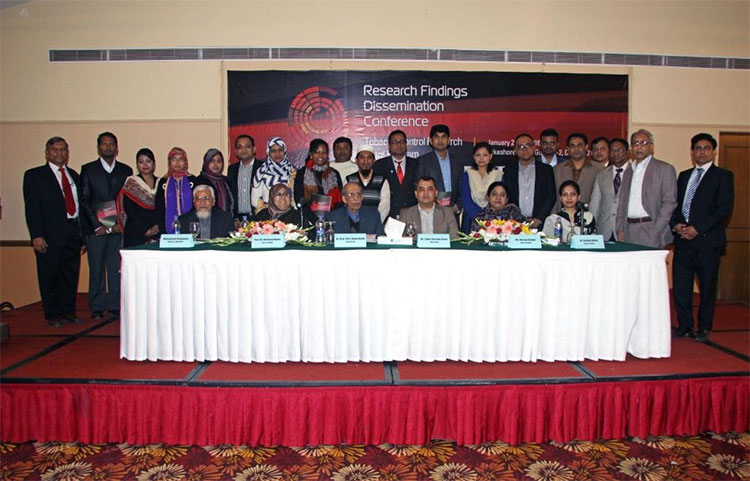
BCCP and the Institute for Global Tobacco Control based at the Johns Hopkins Bloomberg School of Public Health (JHSPH) jointly organized the Research Findings Dissemination Conference on Tobacco Control in Bangladesh. The two-day conference was held on January 26-27, 2016 in Dhaka.
The findings of the twenty research projects of previous year’s twenty research grant programs were presented in the two-day conference through six scientific sessions. Among the 20 research projects, ten were undertaken by ten student researchers of different public and private universities and institutions while the other ten were undertaken by ten experienced researchers of different public and private universities and organizations. Some main topics of twenty researches are 1) Emotional and Behavioral Problems and Cigarette Smoking Behavior: A survey among Bangladeshi Adolescents; 2) Knowledge and Attitudes regarding the National Tobacco Control Law and Smoking Behaviors among Bangladesh Police; 3) Factors Influencing Farmers to Turn to Tobacco Cultivation in Khulna Division of Bangladesh; 4) Compliance with Tobacco Control Law in Public Places: A Survey in Dhaka City; 5) Smokeless Tobacco Use among Floating People in Dhaka City; 6) Level of compliance with the Tobacco Control Act 2005 in relation to exhibition of smoke-free signage in public places in Bangladesh; and 7) The Role of Mass Media in Tobacco Control.
Some important findings of those researches are 1) More than half of the study adolescents’ family members were not aware about their smoking and the current smoking status of respondents was significantly associated with their parents’ education, occupation and family members’ smoking status; 2) There was a lack of knowledge among police personnel regarding various rules and clauses of the National Tobacco Control Law. However, most (98.6%) of them showed positive attitudes regarding the rationale of prohibiting smoking in public places and public transports; 3) Profit per decimal of land in tobacco farming is statistically higher than for alternative crops. In addition to profit, total land holdings, incentives given by the industry, the existence of a pre-fixed price of tobacco leaves, and the demonstration effect on the production of tobacco cultivation by a neighbor influenced the probability of tobacco cultivation; 4) 85.0% of one study respondents from all categories of city dwellers knew about the tobacco control law in public places and more than half of the city dwellers did not see any smoke-free signage in public places; 5) The factors that influenced a person to become addicted to smokeless tobacco (SLT) were easy availability, socially accepted, peer influence, lower price of SLT products compared to cigarettes and majority (91.0%) had knowledge of physical and harmful effects of SLT use; 6) A majority (94.4%) of another study respondents knew about the existence of the Tobacco Control Act 2005 and 86% knew that smoking was banned at public places but only three-quarters knew that violation of the law would result in monetary fine as punishment; and 7) One study showed evidence that mass media coverage of tobacco control issues is positively influencing the context of comprehensive tobacco control programs.
National Professor Dr. Brig. (Rtd.) Abdul Malik, President, National Heart Foundation of Bangladesh chaired the inaugural program while Mr. Saber Hossain Chowdhury, MP and President, Inter Parliamentary Union was present as Chief Guest. “Number of people who die in South Asia due to tobacco use is one million” mentioned by Mr. Saber Hossain Chowdhury and he also asked that we need to get a handle on Tobacco Control to gain Sustainable Development Goals. Mr. Mohammad Shahjahan, Director and CEO, BCCP delivered opening remarks. On the other hand, in the closing session, Mr. Muhammad Ruhul Quddus, Joint Secretary and Coordinator, National Tobacco Control Cell, Ministry of Health and Family Welfare was present as chairperson.
Moreover, Ms. Roxana Quader, Additional Secretary (PH and WHO), Ministry of Health and Family Welfare was present as Guest of Honor. At the end Dr. Shahida Haque, Senior Deputy Director (Research), BCCP delivered vote of thanks.
“Advances in Strategic Communication Workshop’’ held
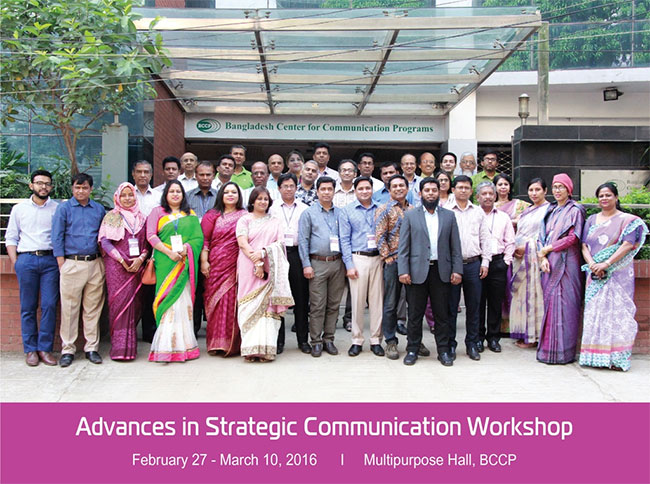
BCCP’s 21st Advances in Strategic Communication Workshop was held from February 27-march 10, 2016 in Multipurpose Hall of BCCP office, Mirpur. Twenty four mid to senior-level professionals from different government, non government and individuals attended the two-week workshop. In an informal closing ceremony, Ms. Yasmin Khan, Program Director of BCCP handed over the certificates to the participants.
The objective of the workshop was to provide the participants an opportunity to strengthen the Social and Behavior Change Communication understanding, knowledge and skills. The highly participatory approach of the workshop was designed and aimed at helping participants develop effective advocacy, social mobilization and program communication strategies while strengthening their ability to implement dynamic communication programs.
Facilitated by nationally and internationally reputed personalities, the workshop introduced the participants with different tools and techniques of the state-of-the-art communication and the participants should now be able to design, develop, implement and evaluate communication programs more effectively. The participants were also exposed to the use of social media and other smart technologies for effective SBCC.
Modeled after the Advances in Family Health and Social Communication Workshop held regularly at Johns Hopkins Center for Communication Programs, Baltimore, USA, this workshop explored the essential elements of successful communication in the context of social development programs. Every year BCCP organizes this two-week workshop.
Dissemination of Digital Resources to Strengthen SBCC in Bangladesh held
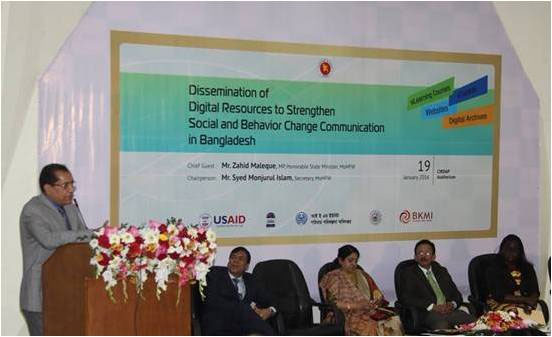
An event to dissemination a set of Digital Resources to strengthen Social and Behavior Change Communication (SBCC) in Health, Population and Nutrition sector in Bangladesh was held on 19 January 2016 at CIRDAP Auditorium, Dhaka. The Chief Guest Prof. Dr. Deen Mohammad Noorul Huq, Director General, DGHS along with other guests of Dias formally disseminated the Digital Resources by pressing a button. He urged all the stakeholders to utilize these ICT-based tools to improve the coordination, harmonization and quality of SBCC activities.
A short video documentary on digital resources was screened in the program. The resources include an SBCC eToolkit for Field Workers working on Health, Population and Nutrition (http://www.k4health.org/bangladesh-toolkits); an SBCC eToolkit for Program Managers and Planners (https://www.k4health.org/toolkits/bangladesh-program-managers); an eLearning course in Bangla with eight modules for field workers (http://bdsbcc.org); two eLearning courses, both available in Bangla and English, for SBCC program managers and planners (http://bdsbcc.org); and Digital Archives for three government units Bureau of Health Education (BHE): http://bhe.dghs.gov.bd/digitalarchive/; Institute of Public Health Nutrition (IPHN): http://archive.dghs.gov.bd/iphn_digitalarchive/; Information, Education, Motivation: http://www.dgfpbd.org/digitalarchive/). All are available online, free of charge. The eToolkit for Field Workers is also available offline and as an Android app (BD HPN Toolkit).
With technical support from BKMI, three communication Units of MoHFW have developed these resources to strengthen Health, Population and Nutrition SBCC in Bangladesh. Some of these digital resources are first of its kind not only in Bangladesh, but also in the region.
Ms. Roxana Quader, Additional Secretary (PH & WH), MoHFW delivered welcome speech and told that the resources were a step forward towards achieving Hon’ble Prime Minister’s vision for a Digital Bangladesh.
Prof. Dr. Abul Kalam Azad, Additional Director (Planning & Development) and Line Director of MIS, DGHS, commented that these ICT-based tools were developed with a great precision and would facilitate the wellbeing and improved health of the people in Bangladesh.
Mr. Mohammad Wahid Hossain, Director General, DGFP chaired the program while Acting Director of USAID Ms Marietou Satin spoke in the occasion.
Around 135 professionals from different ministries, departments and institutions, A2i, NGOs, INGOs, development partners, academics, and others attended the event.
BKMI, funded by USAID, is a technical assistance project jointly implemented by Johns Hopkins Center for Communication Programs (JHCCP), Baltimore, USA and BCCP.